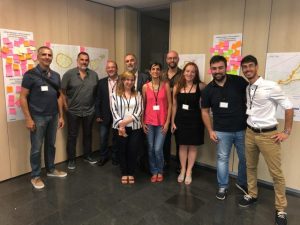Segundo taller del proyecto MarSP 28 September 2018
 El Centro Oceanográfico de Canarias acogió el pasado viernes, día 28 de septiembre, en Santa Cruz de Tenerife, el segundo workshop del proyecto europeo de Planificación Espacial Marina en la Macaronesia (MARSP– Macaronesian Marine Spatial Planning), organizado por el Instituto Universitario ECOAQUA de la Universidad de Las Palmas de Gran Canaria (ULPGC), en el que 65 expertos de diversos sectores económicos, entre ellos el investigador de la UCA Victor Cordero, debatieron sobre cuáles son las áreas prioritarias y los procesos de planificación que se deben seguir en las tres regiones ultraperiféricas de la Macaronesia (Azores, Madeira y Canarias) dependientes de Portugal y España.
El Centro Oceanográfico de Canarias acogió el pasado viernes, día 28 de septiembre, en Santa Cruz de Tenerife, el segundo workshop del proyecto europeo de Planificación Espacial Marina en la Macaronesia (MARSP– Macaronesian Marine Spatial Planning), organizado por el Instituto Universitario ECOAQUA de la Universidad de Las Palmas de Gran Canaria (ULPGC), en el que 65 expertos de diversos sectores económicos, entre ellos el investigador de la UCA Victor Cordero, debatieron sobre cuáles son las áreas prioritarias y los procesos de planificación que se deben seguir en las tres regiones ultraperiféricas de la Macaronesia (Azores, Madeira y Canarias) dependientes de Portugal y España.
El proyecto MarSP está financiado por la agencia EASME de la UE. La Universidad de Cádiz, a través del INDESS, participa en el mismo junto con otras entidades de Madeira, Azores y Canarias.

